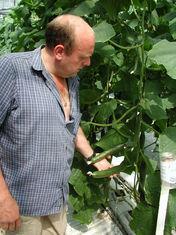
Certis has reported encouraging results from trials of a new natural option for control of whitefly and aphid pests, which is suitable for both the edibles and non-edibles markets.
Cucumber grower Marco Caffarelli produces under 1.5 acres of glass in Newmarket. He had been having trouble when biological controls fail to cope with whitefly, but spray treatment can interfere with his IPM routine.
“Cucumbers need to be picked every day while they are young,” Marco explains, “If you have to spray crops for pests and then have a three day harvest interval, the fruit gets too big and spoils,” he explained.
Caffarelli began using a trial with Spruzit to treat a whitefly infestation in June this year after he was advised that it offers short persistence and is suitable for use in an IPM system.
The broad spectrum insecticide Spruzit contains a formulation of natural pyrethrins which affects the pest nervous system, plus rapeseed oil which has a physical effect. Caffarelli used it in a mist application in the glasshouse overnight. “I have made two applications so far and the glasshouse is really clean,” he said, commenting that the real benefits come from the short persistence and zero day harvest interval which enables quick reintroduction of biological controls as well as timely harvesting.
He adds that there is also no overpowering smell as he has experienced in the past with other products.
Ornamental grower Rochfords nursery in Hertfordshire has also suffered with aphids and whitefly in the past. Growing hardy and herbaceous shrubs across four hectares (10 acres), it primarily uses IPM to control pests, but have found they were restricted to a range of bio friendly chemicals. The firm began a trial of Spruzit earlier this year to treat an aphid problem on the evergreen shrub Vinca Major.
“We sprayed the shrubs at a rate of 6 ml/l, and within two days the aphid population had decreased by 50 percent,” reported the company’s Nick D’Arcy.
Rochfords also tested Spruzit on Ceanothus which had a whitefly infestation. “We used a higher rate of 15 ml/l because it was quite a heavy infestation, but within five days the whitefly population was reduced by 50 percent,” D’Arcy said, adding that after two follow up sprays the whitefly was completely eliminated.